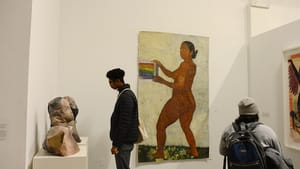Stay in the Loop
BSR publishes on a weekly schedule, with an email newsletter every Wednesday and Thursday morning. There’s no paywall, and subscribing is always free.
The skin you're in
Asian Arts Initiative presents 'Loving Blackness'

Curated by artist Jaishri Abichandani, the current exhibition at the Asian Arts Initiative (AAI), Loving Blackness, is a poignant reminder that what divides can also unite. Moments of cultural tension among blacks and Asians give way to expressions of solidarity and progress.
Featuring the work of more than 20 artists from around the country of black and/or Asian descent, Loving Blackness depicts the shared experiences of black and Asian communities. Its artists unpack ideas of oppression, systemic racism, and socioeconomic disparities through paintings, photography, sculpture, and video.
The show’s description explains, “Black and Asian communities have coexisted side by side across the world for centuries. Our history includes . . . indentured servitude and slavery. . . . It is fraught with tensions first inflamed by the horrors of colonialism and has now been transformed into a tangled web of inequities. . . . This historic friction has provided opportunities for solidarity . . . while acknowledging our collective debt to the efforts of the civil rights movement in gaining liberties.”
Embracing identity
Strolling through the gallery, I was struck by the vibrancy, intricate craftsmanship, beauty, and strength depicted in many of the pieces on display. As a black woman, this is just what I wanted to see in an exhibition about blackness.
While studying each piece, the idea that coalesced the exhibition’s themes was black identity, in which artists Mequitta Ahuja and Elia Alba shine. Their work resonated deeply with this writer, who like many women of color, have wrestled with loving her “nesses” – brownness, blackness, curviness, nappy-hairedness.
Ahuja’s exploration of the self was displayed with ferocity and freedom. She is the product of an African-American mother and a South Asian Indian father, and her work plays with textures and bold colors while anchoring a provocative subject: herself.
Her black and Indian roots layer her work, as do references to Egyptian and Hindu forms. The piece in Loving Blackness – Dream Sequence: Winged II – depicts Ahuja naked with her arms lifted up, feathers hanging wildly from them. Her skin radiates an ebony glow with flecks of red, her thick hair resting on her shoulders.

Ahuja paints herself with crossed eyes, a signature feature in all her paintings that's reminiscent of Frida Kahlo’s unibrow. I enjoy the honesty and transparency in Ahuja’s work. As she finds freedom in who she is, she allows the observer to do the same. In her artist statement she says, “As I get older, struggles with identity fade and issues of the body, mind, and our unique place in history rise to the surface.” If Ahuja, with her dark skin, kinky hair, and brazen hips, can discover autonomy through her art, every woman has the opportunity to do the same if they dare, which Ahuja’s work challenges us to do.
Shaping blackness (literally)
While Ahuja’s piece explores the liberty that comes from loving one’s blackness, Alba’s work Busts seems to wrestle with the more challenging notion of cultural bias reshaping and rupturing blackness.
Alba, a multimedia artist, uses photography and textiles to construct two three-dimensional busts of black men. The busts’ countenances are distorted, a result of the images being transferred to fabric, then shaped on top of a wire armature.
“As societies struggle with subjectivity, personal identities have ‘become’ fractured and complex; they are in a state of constant re-definition,” Alba’s artist statement explains. “This experimental vision of subjectivity comments, not only on the ephemeral nature of identity, but presents the viewer with a collapse of perception.”

The identities society projects onto people of color are often rooted in stereotypes, prejudice, and fear. The redeeming moment in Alba’s piece comes from the idea that we have the power to redefine the cultural wounds that permeate us to become more of who we are and the best of who we are.
Valuing “nesses”
In the current political landscape, when one’s “nesses” seem to be constantly under siege, Loving Blackness is a refreshing dive into the complexities and strains that can arise harmoniously from our differences. During a roundtable discussion facilitated by Abichandani, several Asian women artists and activists spoke candidly about being the mothers of children who are also of black or Latino/a descent.
The women spoke about their Asian identity and how it has informed their upbringing and perceptions of the world, and how they are now rearing their black children to navigate an even more multifaceted and, at times, hostile landscape. The conclusion: Defining a meaningful sense of self is complicated. However, as one panelist shared, valuing your identity comes from creating a space where everyone is uplifted no matter their hue. Loving blackness means loving others and loving yourself.
What, When, Where
Loving Blackness. Through April 21, 2017, at the Asian Arts Initiative, 1219 Vine Street, Philadelphia. (215) 557-0455 or asianartsinitiative.org.
Sign up for our newsletter
All of the week's new articles, all in one place. Sign up for the free weekly BSR newsletters, and don't miss a conversation.

 Jarreau Freeman
Jarreau Freeman